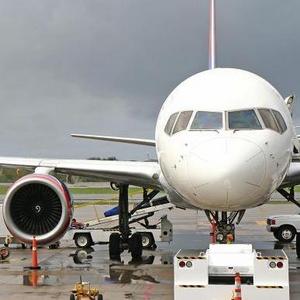Boeing, Embraer to open joint biojet research center in Brazil

May 13, 2014
BY Ron Kotrba
Two leading aerospace companies, Boeing and Embraer S.A., have signed a memorandum of understanding (MOU) to open a joint research center to advance a sustainable aviation biofuel industry in Brazil.
Under the MOU, the two companies will perform joint biofuel research, in addition to funding and coordinating research with Brazilian universities and other institutions. The research will focus on technologies that address gaps in a supply chain for sustainable biojet fuel in Brazil, such as feedstock production and processing technologies. The new research center is to be located in São José dos Campos Technology Park.
“Boeing is working aggressively around the world to expand the supply of sustainable aviation biofuel and reduce aviation’s carbon emissions,” said Julie Felgar, managing director of environmental strategy and integration, Boeing Commercial Airplanes. “With our joint biofuel research center, Boeing and Embraer are making a strong commitment toward a successful, sustainable aviation biofuel industry in Brazil.”
Advertisement
Advertisement
“Embraer is committed in supporting the development of sustainable biofuels for aviation and the joint efforts with Boeing will undoubtedly contribute to the company continuing to be in the forefront of research in this area,” says Mauro Kern, executive vice president, engineering and technology, Embraer. “Brazil has tradition in the area of alternative fuels and enormous potential yet to be explored in bioenergy research.”
“Boeing and Embraer have a tremendous opportunity to work together to enhance Brazil’s aviation biofuel capabilities, as well as the global industry’s access to aviation biofuel,” said Al Bryant, vice president, Boeing research & technology-Brazil.
In 2013, Boeing, Embraer and the Fundação de Amparo à Pesquisa of the State
Advertisement
Advertisement
of São Paulo (FAPESP) completed an action plan—Flightpath to Aviation Biofuels in
Brazil—that identified gaps in a potential biofuel supply chain. The joint research between Boeing and Embraer will help address those gaps.
More than 1,500 passenger flights using biojet fuel have been conducted around the world since it was approved for use in 2011.
Related Stories
Luxury North Dakota FBO, Overland Aviation—together with leading independent fuel supplier, Avfuel Corp.— on May 19 announced it accepted a 8,000-gallon delivery of sustainable aviation fuel (SAF) on May 12.
Neste and FedEx, the world’s largest express cargo airline, have agreed on the supply of 8,800 metric tons (more than 3 million gallons) of blended Neste MY Sustainable Aviation Fuel to FedEx at Los Angeles International Airport (LAX).
Wheels Up Experience Inc. on May 6 announced the launch of its new SAF program, under which Wheels Up will partner with Delta Air Lines to purchase SAF, allowing private fliers to participate regardless of their flight operator or departure airport.
The USDA reduced its estimate for 2024-’25 soybean use in biofuel production in its latest WASDE report, released May 12. The agency expects soybean oil use in biofuel to increase during the 2025-’26 marketing year.
HutanBio's microalgal biofuel production shown to be net-negative in an independent life cycle assessment by EcoAct
HutanBio on May 8 announced that the production process for its proprietary HBx microalgal biofuel achieves net-negative carbon emissions, based on an independent cradle-to-gate life cycle assessment (LCA) conducted by EcoAct.
Upcoming Events










